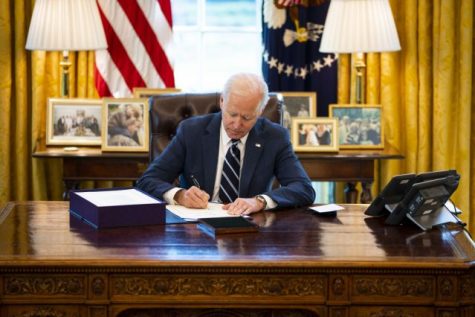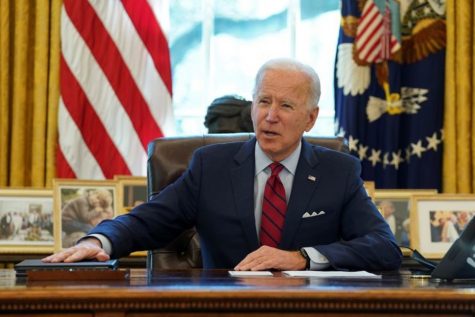Georgia run-off election runs deep for the country at large
With Trump’s multiple losses in court, the future of this nation may seem to be on the path of a democratic worldview, but such a reality relies on the Georgian runoff senate elections. Along with the presidency, many offices were up for election on November 3 from local to state positions. Such was the case for Georgia.
Prior to the election, Democrats held onto 46 Senate seats, and Republicans held onto 52 (the two other senators, Bernie Sanders of Vermont and Angus King of Maine, are independent, but liberal allies.) The results of November 3 have been a success for the Democratic Party not only in the executive branch, but in congress as well.
Democrats lost ten seats in the House of Representatives, but will maintain the majority. In the Senate, Democrats have, so far, won one seat which means Republicans have lost one bringing the Senate results to 50 seats for Republicans and 46 seats for Democrats as well as the two independent liberal allies keeping their positions. Two senate seats remain to be filled, both belonging to the state of Georgia.
There are two reasons why Georgia is the only state voting for two senators at the same time this election, as well as why there is no official winner for either.
The first reason can simply be pinned on pure chance. Republican Senator David Perdue was elected in 2014 to serve in the senate, and thus following his six year term he must be reelected to maintain control of his seat. The other senate position being filled was actually supposed to be voted on in 2022, but then Senator Johnny Isakson left it in 2019 due to health reasons. Under Georgia state law, the governor appointed a temporary replacement until the next fall election- that person being republican Kelly Loeffler. If Senator Loeffler wins the election, she can finish Isakson’s term which ends in 2022 and thus try to win another term as an incumbent.
The secondary reason is the way Georgian elections are conducted- the runoff system. This runoff system mandates that a candidate must get a majority of the vote (at least one vote over fifty percent) or runoff elections at a later date will occur. For both senate elections in Georgia no candidate from the two elections achieved this threshold and thus dual-runoff elections are set for January 5, 2021.
The senate election for republican David Perdue’s seat had a relatively small field of candidates with the main challenger being democrat Jon Ossoff. The incumbent republican won 49.7% of the vote and Ossoff achieved 47.9%.
The special election determining if Loeffler will finish out her predecessor’s term is far more fractured than the election of Perdue v. Ossoff. In this election multiple democrats and republicans ran which caused a fracture in the vote causing democrat candidate Raphael Warnock to come out in first with 32.9% of the vote compared to Loeffer’s 25.9% of the vote.
Both Loeffler and Warnock face challenges in uniting their respective party’s candidates as to not split the vote, but Loeffler will face greater difficulty in this respect. This lack of cohesion can be seen by the first round of voting for her spot in the senate where Doug Collins, a representative in the house and a republican challenger, garnered 20% of the vote.
Despite Collins’ backing Loeffler as soon as her place above him in the polls became clear, uniting the Georgia GOP may be the most difficult task in this race for the incumbent. This is due to republicans in Georgia being split on the issue of Loeffler v. Collins initially, as well as controversy Loeffler has caused with claims of being “more conservative than Attila the Hun” as NPR reports, and her backing of candidate Maorie Taylor Greene, a Q-Anon conspiracy theorist according to Politico and the Independent.
This potential trouble is shown in polls reported by 538, a leading polling organization, where Loeffler is behind Warnock. It is only by a slim margin of 0.4% though, and within the margin of error. This is the case for the regular election even more so where Republican senator Perdue is only beating Democratic candidate Ossoff by 0.2%.
The results of this race will have drastic consequences for the nation, and this is best shown by both Biden and Trump’s campaigning for their respective candidates. Republicans need to only win one of the senate elections to attain a majority in the senate, whereas democrats need both seats to be blue to have the same amount of senate seats as the GOP. This would give democrats the majority due to the vice president having the final vote if there were a tie.
Winning both seats would give the democratic party immense power when it comes to legislation. With the house, senate, and presidency under liberal control, Biden could easily push through many of the reforms he campaigned on as president such as raising the minimum wage, tackling climate change, and fixing the Affordable Care Act (Obamacare).
Republicans winning at least one seat positions them to be a bulwark against the democratic party’s agenda and gives them some time to coalesce and try to make a comeback in the 2022 midterm elections. Such a bulwark could only be effective if every republican senator operated with such strict unity that not even one senator voted against or abstained from voting from the party line. A difficult task, but certainly not possible.
Until the results of January 5, the limelight will continue to center on Georgia. Georgians not only vote for who represents their state, but also the future of the nation and how we will come back from the crisis the nation is plunged in.

James Miller is an eighteen year old Greater Latrobe High School Senior. James likes to read and hangout with his friends. He has a passion for politics...















